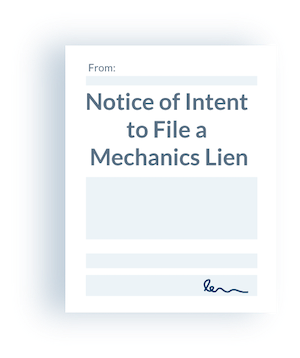
We’ve written a lot about payment bonds and bond claims over the years. Generally speaking, when there’s a payment issue, the remedy for a private construction project is a mechanics lien claim, and the remedy on a public construction project is a payment bond claim. However, payment bonds are sometimes also used on private projects.
But no matter what type of project you’re on, the best way to manage the sometimes difficult payment process is by proactively communicating with the other project stakeholders in order to prevent payment problems from happening before they even have a chance to start. The way that’s usually done is by sending a preliminary notice.
And even after a payment issue develops on a project, proactive communication is still called for in the hopes that the issue can be resolved before escalating further. And that’s where the Notice of Intent to Make a Bond Claim comes in (as well as the corresponding Notice of Intent to File a Mechanics Lien). Continue reading to find out what a Notice of Intent is and how it helps companies get paid the money they’ve earned.
What Is a Bond Claim?
Just to refresh your memory, a bond claim is used as a remedy on public projects (and sometimes, on private jobs, too) in the event of non-payment. It mirrors a mechanics lien which is used as a remedy on private projects. A bond claim is different from a lien claim because instead of filing a claim on the property itself, a claimant submits a claim against a payment bond the general contractor provides after first obtaining that bond from a surety.
What Is a Notice of Intent to Make a Bond Claim?
A Notice of Intent to Make Bond Claim is just like a demand letter, but it’s a demand letter that carries with it some real consequences. It’s a document that warns the interested parties, usually the general contractor (but also the property owner and the surety), before filing a claim against the payment bond.
Is a Notice of Intent to Make a Bond Claim Required?
Notice of Intent to Make Bond Claim is not typically required. However, Missouri does require that remote suppliers send a notice after they finish the job. Whether or not it’s a requirement, we recommend sending a notice of intent anyway because the warning that it represents is a heads up that gives all of the interested project stakeholders one last chance to get the payment issue resolved before a bond claim is filed.
In fact, sending a Notice of Intent to Make a Bond Claim often spurs by itself, since the other project stakeholders want to do everything they can to avoid a bond claim.
Free Download Available
As stated above, even though this is a voluntary document, we strongly recommend sending it before making a payment bond claim (as long as there’s still enough time). We’ve got a free Notice of Intent to Make a Bond Claim template you can download and use on your own projects.



